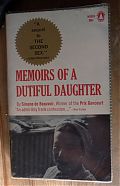
Simone de Beauvoir
Memoirs of a Dutiful Daughter
If the title of Simone de Beauvoir’s first memoir was not an ironic one then the memoirs would have read redundant. Dutiful, in mind and spirit for the first third of the book, Simone de Beauvoir cannot be considered, for her life and her works broke all sorts of pallid conventions. But she must have seen herself that way, especially when she was young, going to a private Catholic school, her fervent religion and patriotism, her bourgeois values that she eventually lost, still young.
That’s just part of why reading an autobiography by Simone de Beauvoir is a marvelous treat, and has been since I discovered The Prime of Life eight years ago. That book threw open so many windows within me that I’m almost afraid to go back to it, scared that it will have lost its effect. (When in fact, it’s that I don’t need so many literary fireworks anymore.) Lucky for me, de Beauvoir wrote a whole handful of autobiographies, so I can go back to her without repeating and gain again the rich insights to life and writing that she so expertly disperses.
Always while reading these autobiographies I wonder, how has de Beauvoir remembered her life in such minute detail? And these memoirs, being about her earliest childhood to very early twenties, made me ask that question even more. Because it’s not just the outer details, the way things look or their actions, but it is her intense inner-life—which becomes even more active and varied as she grows up—that she recalls with the most vivid fastidiousness. Some of my favorite scenes in the book were Simone’s seriousness about almost everything; her studies; the early mystic transports of nature and religion.
Simone de Beauvoir began reading at a very early age (three, I think) and knew from a slightly older age that she wanted to write. She had an almost inherent understanding as to the purpose of books, the value of literature, and their relationship to her person. Her dad was a reader and exposed her to many books though withheld others on account of “immoral” content. Despite the restraints, she got ahold of the books she wanted and read them without constraint. (Jeanette Winterson in this article describes a similar situation in which the banning of books provokes more interest.)
…the words and the cadences, the lines and the versus were not aids to make-believe: but they rescued from silent oblivion all those intimate adventures of the spirit that I couldn’t speak to anyone about; they created a kind of communion between myself and those twin souls which existed somewhere out of reach; instead of living out my small private existence, I was participating in a great spiritual epic.
Simone spent most of her childhood, adolescence and early adulthood bent over the quest for learning, “all day long I would be training myself to think.” Her ravenous studies paid off as she usually graduated at the very top of her class, except at the Sorbonne where she was passed by Simone Weil; and in the philosophy competition, Sartre. It was her precocious and adamant learning that troubled the bourgeois values upheld by society and her parents. It seems fantastic to me now that a woman studying and excelling should be looked down upon, but that is only because Simone de Beauvoir helped to alter women’s social landscape.
Most women in Simone’s class got degrees as another superficial layer of marketability as a wife (a tradition that continues in some Asian countries). In Ancient Rome women had more freedom, for there were less upright and stuffy conventions than in France a hundred years ago. So when Simone began to think for herself, after training how to think in the great schools of thought, the results, in her actions and work, were unstoppable. (See The Second Sex.)
What alarmed them [friends] was the most firmly rooted of my convictions: my refusal to accept that mediocre existence to which they, in one way or another, said yes, and my frantic efforts to escape from it.
Again, after putting down Simone de Beauvoir’s autobiography, I am convinced of the absolute necessity of her life and works, for myself and for the world.
· · · · · · · · · · · · · · · · · · · ·